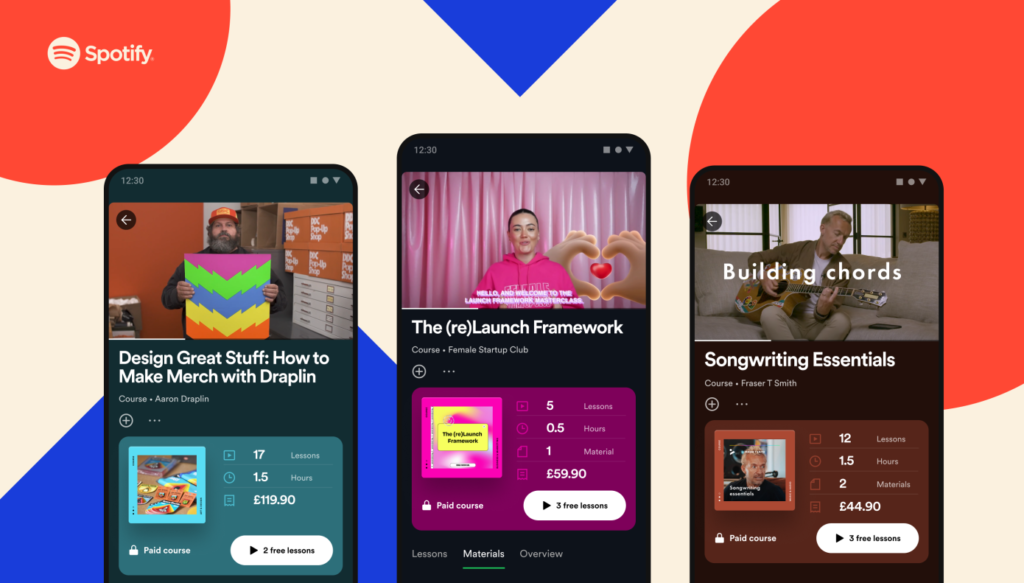Spotify, the leading platform in music streaming and podcast entertainment, expands its content horizon by venturing into e-learning.
With over 600 million users worldwide, the company is piloting freemium video courses in the UK, collaborating with renowned partners like the BBC and Skillshare. The move aims to enhance user engagement and diversify revenue streams beyond its traditional offerings.
The newly introduced e-learning initiative by Spotify features a range of online courses, starting with at least two complimentary lessons. Developed in collaboration with prominent educational content providers, such as the BBC and Skillshare, the courses are priced between £20 to £80 on average.
However, the pricing structure remains consistent for both basic and premium users, marking a strategic approach to attract and retain a broader audience base.
Mohit Jitani, the London-based product director for the education business, said that pricing decisions were part of what it’s testing before considering a mass rollout. “With this launch, we’re trying to understand the demand first, then we optimize how we can make it more compelling and exciting,” he said.
The content will live in both Spotify’s home and browse tabs (under “Courses”), and it’s accessible on the web as well as via the Spotify mobile app.
Similar to popular platforms like YouTube, MasterClass, and LinkedIn Learning, Spotify’s courses offer a variety of video lessons. Interestingly, there’s also a focus on empowering musicians and others to become “education creators” themselves.
While the online learning market has seen significant growth, with an estimated worth surpassing $315 billion in 2023, Spotify’s approach sets it apart. Rather than aiming for interactive content like some competitors, Spotify’s educational content is primarily in the form of on-demand videos.
Spotify’s Educational Initiative Overview
In a landscape where startups vie to become the “Spotify for education,” Spotify’s entry into the educational realm is notable for its emphasis on one-directional video content, making it easy for users to access learning material at their convenience.
Some courses on Spotify may come with extra materials, though these are more likely to be additional documents rather than quizzes or other interactive features. When asked about potential interactive elements or gamification in the future, as well as the inclusion of games on Spotify’s roadmap, Jitani declined to provide any comments.
The initial partners for Spotify’s Courses feature include Skillshare (focusing on creative subjects), PLAYvirtuoso (offering music industry courses), BBC Maestro (similar to Master Class), and Thinkific (for those interested in creating their online learning classes).

According to Jitani, Spotify intends to carefully select which courses it offers, taking into account what topics people are already engaging with on the platform. While there doesn’t seem to be a set limit, a glance at the catalogs of these partners reveals a diverse range of topics.
“We’ll learn a lot about what people are actually interested in [and] we will start getting a lot of segments around that… And then we’ll go and find… the best content,” Jitani said.
Third-party publishers own and license videos to Spotify, which hosts and sells them on its platform. Revenue from sales is shared among creators, publishers, and Spotify, but specific details are undisclosed. It’s uncertain if Spotify will offer benefits to premium subscribers.
Why Education and The UK?
By launching its new initiative in the UK, the company aims to tap into a massive market known for high educational content engagement levels.
The decision to focus on the UK is strategic, given its significance to Spotify’s global operations and its reputation as one of the most active markets for the platform.
Despite its popularity, Spotify has faced financial challenges, experiencing both successes and setbacks in the market. Last year, the company underwent multiple rounds of layoffs, reflecting its efforts to streamline operations.
Additionally, it has struggled to maintain consistent profitability, with recent quarterly earnings reporting a net loss of $81 million.
READ ALSO: Tourism, Ghana’s Bleeding Cash Cow




















